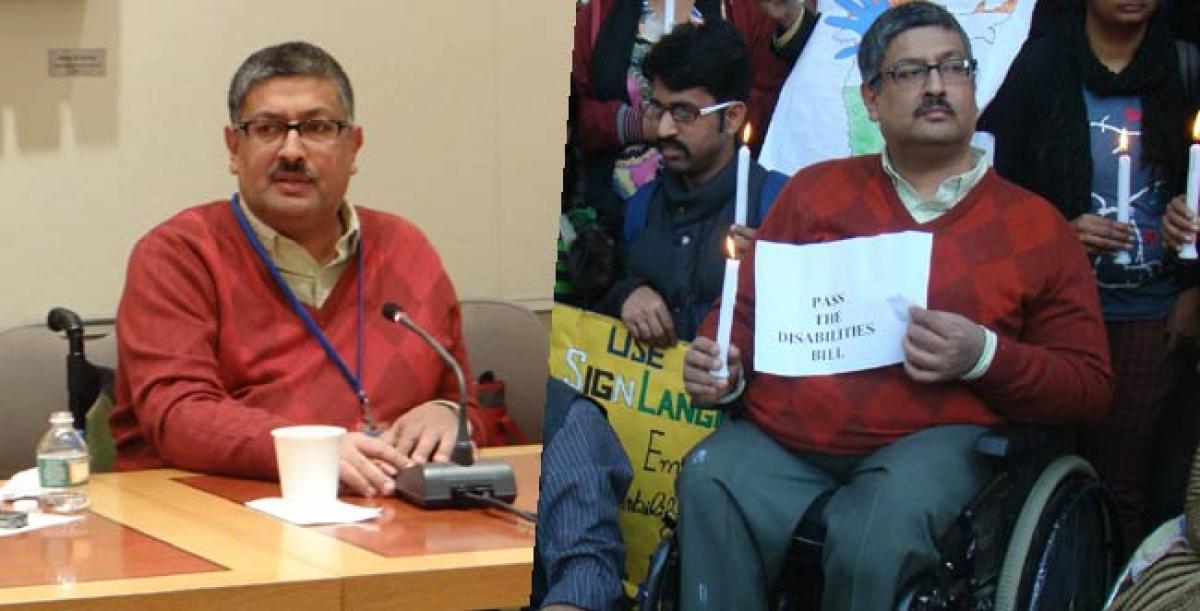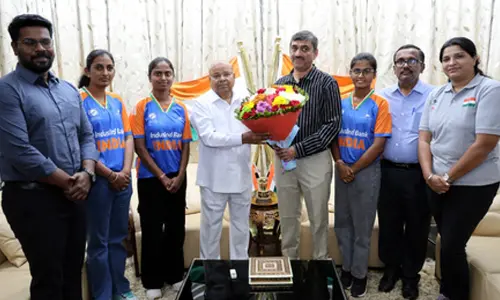Javed Abidi unanimously re-elected DPI Global Chair

India hosted 200 people with disabilities from 70 countries for disability inclusive Sustainable Development Goals
India hosted 200 people with disabilities from 70 countries for disability inclusive Sustainable Development Goals
Are developing countries ready for a disability inclusive agenda for development? This is the question over 200 people with disabilities from over 70 countries from Asia, Africa, CIS, Latin America, and North America & Caribbean asked at the 9th World Assembly of Disabled People’s International (DPI).
DPI is the world’s first cross-disability human rights based global disabled people’s organisation with membership in 150 countries. The theme of the World Assembly was ‘Building Human Capital – Realizing the SDGs for Persons with Disabilities’.
Javed Abidi, having completed one successful four year term, was unanimously re-elected for another 4 year term, post completion to the meeting.
Thanking the DPI World Council, Javed Abidi said, “I am grateful for this honour, especially at a time when we are trying to move policy/decision making on disability to the Global South. I would also like to add that when it comes to Agenda 2030, we can say that SGDs are more inclusive than MDGs. The SDGs are universal, apply to all countries, have a sharp focus on eradicating poverty in all its forms. The MDGs had 8 Goals, 18 targets and 48 Global indicators, whereas the SDGs have 17 Goals, 169 targets and 231 Global indicators. Also the MDGs had no reference to persons with disabilities. We are making progress, and we have to move forward with purpose.”
Speakers at the World Assembly all spoke the same language.
For instance, Yuri Afanasiev, UN Resident Coordinator & UNDP Representative India, spoke passionately about disability and economic development, “It's high time we ramped up lobbying about accessibility, especially because the United Nations Convention on the Rights of Persons with Disabilities has 160 signatories as of February 2016. And if we are not going to make these rights that CRPD enshrines a reality, then mere ratification of the Convention will not amount to anything. This is particularly troubling because the world is now embarking on the 2030 Agenda for Development or the Sustainable Development Goals (SDGs), with the aim to eradicate extreme poverty. How would we be able to achieve this when 20 percent of the worlds poorest are people with disabilities who have no access to information, services, and rights? My son, my brother-in-law are both persons with disability and they earn money and they pay taxes. Hence, skilling persons with disability can see a bump in the GDP upto 1.5%. This is a very compelling economic argument for us to pursue the goals.”
Via a video message, Charlotte Mclain Nhlapo, Global Disability Advisor, The World Bank, said, “We need a better handle on disability data. We need reliable and culpable data, as we plan and budget who to skill and how to skill, and as we move towards building human capital.” Citing a case study of change, and encouraging people to work with the World Bank, she added, “Javed Abidi, Global Chair DPI and his team, have had various consultations with the World Bank. Initially, the World Bank website was not accessible to persons with disability, and now we have moved forward on the same. In the wake of shrinking revenues and shrinking donor budgets, we have to think about how we can be more innovative and make money work better for persons with disability.”
Ambassador Luis Gallegos, fondly referred to as the 'Father of the UNCPRD', said that the understanding that 15% of the world are persons with some kind of disability is too simplistic. “Those persons with disabilities have families - fathers, mothers, daughters, and sons. Hence, 15% is very simplistic, and does not capture the size of the problem.”
He added, “There are 1 billion people with disabilities and even if 2.25 of their close family and friends are interested in accessible technology, they have a huge purchasing power.”
“In the US, the largest unbanked population is persons with disabilities,” said James Thurston, VP Global Strategy and Development for G3ict, “and we suspect that it’s pretty much the same in the whole world.”
The two day event saw the convergence of more than 200 people with disabilities from over 70 countries from Asia, Africa, CIS, Latin America, and North America & Caribbean at the 9th World Assembly of Disabled People’s International (DPI).














